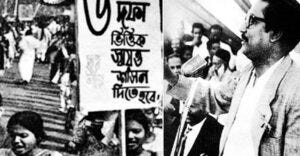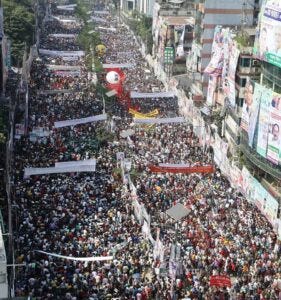The party’s undisputed supremo has given an unequivocal ultimatum to the all powerful government, while an ironclad commitment has been made to the party rank and file that victory is imminent. Political temper is reaching an unprecedented level. Resistance has spread to even the remotest village, and the government repression is just as oppressive and murderous. Every town and every village across the land has their youth under police custody and people who cannot sleep at home for fear. Ultimately, with violence blazing around the land and commercial life under severe stress, the urban and moneyed classes prevail upon the leader to call off the protests.
The andolon has failed.
Tarique Rahman, and before that, Mrs Khaleda Zia. BNP. Awami League. The past decade.
MK Gandhi. Indian National Congress. The Raj. Several decades before partition.
Like on most other things historical, there is no consensus on the life and work of the Mahatma, except perhaps on one thing — there is a wide agreement that he was the father of mass politics as we know it, the politics of andolon, the street politics of rallies and processions, of hartal and bandh, of gherao and oborodh, of civil disobedience and boycotts. Before him, politics in our part of the world happened in the palaces and among the elites. He brought it to the streets and masses. And the 1921-22 non-cooperation movement was the first time our part of the world saw this mass politics. That was the first andolon to shake the entire South Asia.
And it was a failure, if by failure we mean it failed to meet its declared goal. Swaraj in one year — that’s what Gandhi called for. India would not be free for another quarter century. The andolon failed to achieve what it demanded.
Not just that andolon, but most andolons of that kind — where the opposition party announces a clear set of demands and deadlines and makes its case in the street — fails. Let’s keep to the examples from our part of the world for brevity. In August 1942, Gandhi called the Raj to Quit India. The Raj didn’t oblige. Almost a quarter century later, in June 1966, Sheikh Mujibur Rahman called an andolon to achieve maximum regional autonomy for the then East Pakistan. Ayub Khan, the Pakistani president, threatened to use the language of weapon against Mujib and his party. Within weeks, the streets were quiet.
Fast forward another two decades to 1987. Awami League, BNP, leftists, and Jamaat-e-Islami were united in demanding that HM Ershad steps down and allows free and fair election. The opposition parties called for a siege of Dhaka on 10 November to achieve their objective. The opposition failed. Ershad would be in power for another three years.
Wait a minute here, this is selective history, all the successful andolons are being left out — one might retort. Let’s think through these seemingly successful andolons carefully.
The two andolons most comparable with the BNP’s recent ones are those AL launched against past BNP governments. And to the extent that the BNP governments were unseated in 1996 and 2007, it would seem that AL andolons were successful.
It would seem so, but the reality was a bit more nuanced in both cases. In 1995-96, Mrs Zia finished her term and held an election — street protests could not prevent that — and amended the constitution that ushered in the caretaker system. The BNP government left office on its own term, and was not forced out. It’s not at all so straightforward that AL’s andolon succeeded. And a military coup took place in January 2007. To the extent that the AL was not demanding a coup, did the andolon succeed?
Wait, we’re still missing the seminal events in our history — what about 1952, 1969, 1990?
Let’s think through those events. In each case, there were youth-led urban protests that quickly escalated and changed power dynamics. These were indeed events when the street trumped the palace. But in each of these cases, the organised political parties came late to the game. And in each case, the most organised of the parties (and other political players) ultimately reaped the benefit.
The kind of andolon that happened in 1952 or 1969 or 1990 cannot be predicted in advance, but after they happen, they seem almost inevitable — these are the proverbial black swan events. And while some of them succeed, not all do. Students of Dhaka University and elsewhere rose up against military regimes in 1962, 1983 and 2007, and there was the safe streets movement of 2018 — but the regime survived in each case.
Evidently, it would appear that BNP’s repeated andolon against the Hasina regime has failed. The regime has pulled off the third consecutive one-sided election. So, the andolon has failed. But then again, andolons usually fail.
The andolons opposition parties launch are usually thwarted because the regime can see them coming, and take appropriate actions. For a democratic government, such as that of Mrs Zia in the 1990s, the appropriate action was to allow the opposition to enforce weeks of hartal without repressive acts. For the military rulers after 1947 and the Raj before then, the appropriate action was to censor opposition media, lock up opposition leaders and activists under anti-sedition laws (that is, they were political prisoners), and resort to more drastic means such as the Section 144, curfew, and open firing as last resorts.
For the Hasina regime, the appropriate action has included everything the imperialists and military rulers did, plus using sophisticated surveillance, politicised courts that convict political activists on trumped up criminal charges, deadly firings, extrajudicial killings, and enforced disappearances (albeit the last two have diminished since Dec 2021 because of RAB), and most heinously, going after the family members of the political activists — father beaten to death due to son’s BNP affiliation, wife arrested for husband’s politics, and so on.
Against that force, what andolon strategy would have succeeded? Again, keep in mind that andolons led by Gandhi to Mujib failed to achieve their immediate objectives when the regime was far less repressive than the one led by Hasina.
If their andolons failed, why did Gandhi and his followers persist? Why did the opposition parties in Bangladesh continue with andolon? Why did BNP call for an andolon?
Because, dear reader, while each specific andolon failed, the underlying politics eventually proved successful. India did become free of British rule. Bangladesh did become an independent country. Democracy was restored. From Gandhi in 1920 to Khaleda Zia in 1990, the arc of history of andolon in our part of the world is very clear — those causes and demands that resonated with the people eventually triumphed, even if the specific andolons failed to achieve their particular demands within the specified deadlines and ultimatums. The andolons themselves were particular exercises within a broader programme, battles in a longer campaign. Successive repressive regimes won each of those battles, but still lost the war.
What do we see when we judge the current andolon against that broader historical canvass?
That BNP has failed to prevent yet another one-sided election is self-evidently true. That Hasina has turned Bangladesh into a personalised totalitarianism is self-evidently true. But it was also true that the Raj prevailed in the 1920s and 1942, and the military dictators prevailed in the 1960s and 1980s. It has also been true that nationalists and democrats failed in many andolons of the past century. It is also true that nationalists and democrats shook off the imperialists and dictators.
And as long as BNP’s politics of nationalism and democracy remain resonant with the people, it will triumph against Hasina — this too shall prove to be true.
Dedicated to the 25,000 plus opposition activists under custody, tens of thousands more absconding from home, and all the martyrs of the current movement for democracy.
First published in the Road to Democracy.
Further reading
Recommended by Ahmede Hussain, 2 May 2012
Recommended by Yael Tamir, 2 Nov 2021
বিরাশির বিপ্লব যেভাবে হারিয়ে গেল
সালেহ শফিক, 29 May 2022
Barkha Dutt on the Nuances of Indian Life
Conversation with Tyler Cowen, 29 Jun 2022
The world’s largest democracy is collapsing before our eyes
Zack Beauchamp, 21 Jun 2023
The Browser, 23 Aug 2023
Branko Milanovic, 31 Aug 2023
Can India Challenge China for Leadership of the ‘Global South’?
Damien Cave, Mujib Mashal and David Pierson, 12 Sep 2023
Dr Yunus’ conviction sets a repugnant precedent
Kamal Ahmed, 3 Jan 2024
সম্পাদকীয় প্রতিষ্ঠান কি বিলীয়মান
আতিকুর রহমান, 4 Jan 2024
Timothy Snyder, 7 Jan 2024
বাংলাদেশ এক ক্রান্তিকালে দাঁড়িয়ে
Sultan Mohammed Zakaria, 9 Jan 2024







